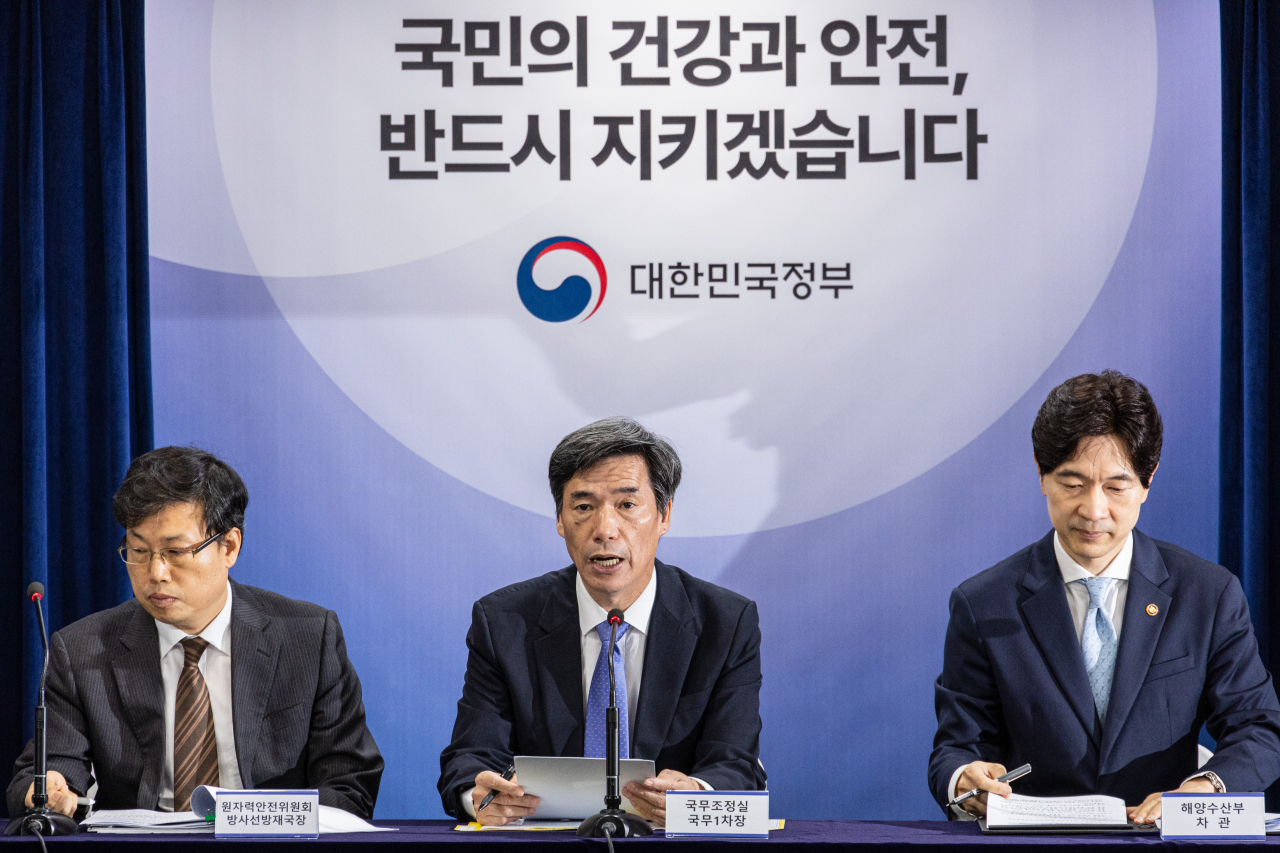 |
Park Ku-yeon (center), the first deputy chief of the Office for Government Policy Coordination, speaks during a press briefing in Seoul on Wednesday. (Yonhap) |
The South Korean government will soon disclose a safety assessment on wastewater to be discharged from the destroyed Fukushima nuclear plant in Japan, officials in Seoul said Wednesday, noting it respects the latest safety evaluation by the International Atomic Energy Agency.
A day earlier, the UN nuclear watchdog endorsed Japan’s plans to filter and discharge the water into the Pacific Ocean in stages, saying in a report that the release “would have a negligible radiological impact to people and the environment.” The report is meant to assuage growing safety concerns raised by neighbors from South Korea and China to many Pacific island nations.
“The IAEA is an authoritative body built on international consensus, and we have repeatedly said we respect conclusions reached there and that stays the same for this case as well,” said Park Ku-yeon, the first deputy chief of the Office for Government Policy Coordination, the body responsible for leading interagency efforts to put the discharge plans in check.
But the official overseeing daily briefings on the Fukushima water safety said the government is still looking into the report word by word to reach its own conclusion. Since August 2021, Seoul has been running a safety task force on the plant crippled by a tsunami in 2011. In May, the government fielded a 21-member team of experts to facilities involved in the release plans.
At the briefing, Park said Japan has put in place mechanisms to thoroughly filter out radioactive elements, so water left at the end of the process does not pose health risks. Some radioactive elements, Park added, will not be filtered out completely, but even so, the amount would not raise health concerns.
Interagency efforts are underway to determine long-term effects of such a discharge, according to Park, who was referring to resurfacing calls to check on the broader ecosystem of fish for contamination.
Park highlighted lifting the current ban on seafood imports from eight prefectures around the destroyed Fukushima plant requires separate discussion, saying endorsing the IAEA report does not mean easing the ban. The government is facing mounting speculation over the spillover effect.
Park Sung-hoon, vice minister of oceans and fisheries, said his ministry will run a 100-day crackdown to single out importers who have not reported or wrongly marked the country of origin, a practice the ministry says is still prevalent despite fines or even prison for such crimes.
“This kind of wrongdoing is what erodes people’s trust in our seafood and we will make sure that doesn’t go unpunished,” Park said during the briefing.
The briefing comes ahead of a three-day trip to Korea by Rafael Mariano Grossi, the IAEA’s director general. Starting the visit Friday following a tour to Japan, the watchdog chief, who personally delivered the agency’s Fukushima report to Prime Minister Fumio Kishida, is expected to discuss it with the Korean chief nuclear regulator and foreign minister.
A string of high-profile meetings involving the issue will continue to take place, with Kishida reaching out to President Yoon Suk Yeol at a meeting next week on the sidelines of a NATO summit in Lithuania. Foreign Minister Park Jin and his Japanese counterpart are also likely to meet next week on the sidelines of the ASEAN Regional Forum, Asia’s biggest security gathering to be held in Jakarta, Indonesia this year.
Japan is eyeing to woo Korea’s support in implementing its discharges plans through the back-to-back meetings, though the move still faces protests in Korea and elsewhere because they believe Tokyo is rushing the process through.
According to local reports, a senior presidential official at Yoon’s office said it respects the nuclear watchdog’s report and that it will more closely work with Japan as discharges take place. The official added Korea will carry out more inspections to ensure that waters around the peninsula are safe.







![[Today’s K-pop] Blackpink’s Jennie, Lisa invited to Coachella as solo acts](http://res.heraldm.com/phpwas/restmb_idxmake.php?idx=644&simg=/content/image/2024/11/21/20241121050099_0.jpg)